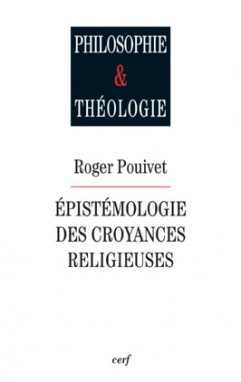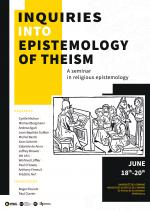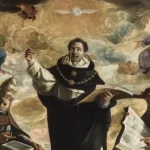Mardi 18 juin 2019 – 13:15 – Jeudi 20 juin 2019 – 18:00 Nancy, MSH Lorraine 91, Avenue de la Libération 3e étage. Salle internationale
Manifestation organisée par Roger Pouivet & Paul Clavier
Avec le soutien de :
Université de Lorraine, pôle scientifique CLCS Archives Henri-Poincaré (CNRS UMR 7117) Département de philosophie (University de Lorraine, Nancy) Institut Universitaire de France Un programme peut être téléchargé sur la page du séminaire :
https://poincare.univ-lorraine.fr/fr/manifestations/inquiries-epistemology-theism-seminar-religious-epistemology
Theism is the metaphysical thesis according to which there exists a spirit (non-physical), present everywhere, the creator and sustainer of the universe, free, able to do everything (omnipotent), knowing everything (omniscient), perfectly good, a source of moral obligation, immutable, eternal, holy and worthy of worship.
This thesis has been, in one way or another, asserted and defended by metaphysicians and theologians, among whom are Augustine, Anselm, Thomas Aquinas, Duns Scotus, William of Ockham, Descartes, Leibniz, and more recently Brentano, Swinburne, Plantinga, Peter Van Inwagen, and many others to-day. All of them, again in one way or another, consider that theism is a rational thesis, which can be proven or at least defended by arguments whose validity is likely to be examined with clarity, rigor and precision, if necessary using formal (logical) tools. However, the rationality of theism has been highly questioned. It has been by believers, for whom it is not reason that ensures us that there is God with such or such attributes. There is thus an anti-rationalist tradition in the different monotheisms. Of course, Sceptics or Atheists also questioned the rationality of theism, claiming that metaphysical and theological claims are ill-grounded, if not contradictory. Religious belief has thus been relegated to an untouchable topic. As John Searle puts it :
Nowadays… it is considered in slightly bad taste to even raise the question of God’s existence. Matters of religion are like matters of sexual preference: they are not to be discussed in public, and even the abstract questions are discussed only by bores. (John Searle, Mind, Language and Society: Philosophy in the Real World, p. 34)
But it might be far from true that the question of religious belief (and sexual preference) is but a private matter or taste (if indeed matters of taste are private, as Searle seems to imply)?
The seminar will first inquire into whether it is appropriate to raise epistemological problems concerning theistic knowledge. Here is a list of questions that may be addressed by participants:
Is theism a metaphysical thesis or a religious claim? In both cases, what kind of justifications can be said to be relevant to its acceptance ?
Is it fair to charge the God of theism of being an onto-theological idol? To which extent the God prayed and worshipped by faithful people is free of such a charge?
Do we have reasons to believe that there is a being such as described by theists?
Do we need reasons to have the right to believe that there is a God such as described by theists?
Are not some divine attributes paradoxical (e.g. divine omnipotence defeated by the paradox of the stone)?
Is theism not only false but contradictory, in affirming the existence of a being whose metaphysical status is inconsistent?
At the very least, this seminar is intended to show that the epistemology of theism is not so boring, contrary to what Searle said. Theism is a lively theme in contemporary academic philosophy, and a quite significant concern in public philosophy outside the academic world. The current popularity of atheist literature, as well as the wave of books written in response to it, is a sign of the vibrancy of theism and of the inquiry on its epistemology. Despite the best efforts of atheists, it is not viable to dismiss theistic philosophy as unworthy of serious intellectual attention. Such attention is exactly the purpose of this seminar.
According to Anthony Kenny :
If there is no God, then God is incalculably the greatest single creation of the human imagination. No other creation of the imagination has been so fertile of ideas, so great an inspiration to philosophy, to literature, to painting, sculpture, architecture, and drama. Set beside the idea of God, the most original inventions of mathematicians and the most unforgettable characters in drama are minor products of the imagination: Hamlet and the square root of minus one pale into insignificance by comparison. (Faith and Philosophy, p. 59)
This is what the seminar intends to illustrate. This is a seminar. The organizers invite experts on the topic. There is no call for contribution. On the other hand, colleagues and students are invited to participate in the discussions we wish to provide.
For this purpose, guests will be invited to send a text a few weeks before the seminar, and will present only an abstract of their paper (20mn), followed by 40mn of discussion. Each participant will be asked to discuss more particularly one of the contributions. So in addition to his own contribution, he will have to prepare remarks and some questions about another contribution.
Programme :
educasup-inquiries-into-epistemology-of-theism-nancy-18-20_a487.pdf
18 June
1:15-1:30 Welcome
1:30-2:30 Roger Pouivet (Université de Lorraine, IUF) “McCabe on the Persons of the Trinity”
Respondent: Michael Bergmann
2:30-3:30 Michael Bergmann (Purdue University) “Can Christians Plausibly Explain Their Religious Disagreements with Non-Christians?”
Respondant: Cyrille Michon
3:50-4:50 Andrea Aguti (University of Urbino) “On Roger Pouivet’s Religious Exclusivism”
Respondant: Roger Pouivet

19 June
9:30-10-30 Michel Bastit (Université de Bourgogne) “Negative or Positive Theology?”
Respondant: Frédéric Nef
10:50-11:50 Paul O’Grady (Trinity College, Dublin) “Theoretical Wisdom”
Respondant: Yann Schmitt
11:50-12h50 Gabriele de Anna (University of Bamberg) “Values and Knowledge of God”
Respondant: Anthony Feneuil
2:00-3:00 Jeffrey Brower (Purdue University) “God as Spatially Located—Aquinas on Omnipresence”
Respondant: Winfried Löffler
3:00-4:00 Jean-Baptiste Guillon (Collège de France) “Semi-reformed Epistemology: Basic Providentialism but Inferential Monotheism”
Respondant: Jeffrey Brower
4:20-5:20 Anthony Feneuil (Université de Lorraine) “The Intensity Curve of Theistic Beliefs”
Respondent: Paul O’Grady
20 June
10:00-11:00 Winfried Löffler (University of Innsbrück) “Swinburne on the probability of God’s existence. A longitudinal study over the last 40 years”
Respondant: Paul Clavier
11:20-12:20 Yann Schmitt (CPGE, Paris 1) “Accepting as a Gain in Rationality”
Respondant: Gabriele de Anna
1:30-2:30 Ide Levi (CPGE, ENS) “Can a Personal Entity be the Supreme Good?”
Respondant: Michel Bastit
2:30-3:30 Frédéric Nef (EHESS) “Is Christian Classical Mystics Rational?”
Respondant: Andrea Aguti
3:30-4:00 Paul Clavier & Roger Pouivet (organizers) Last words and conclusions
INQUIRIES INTO EPISTEMOLOGY OF THEISM: A SEMINAR IN RELIGIOUS EPISTEMOLOGY








